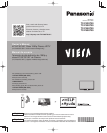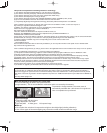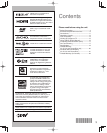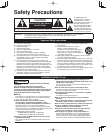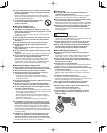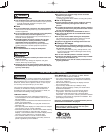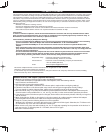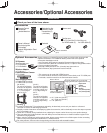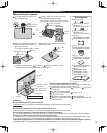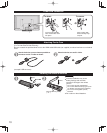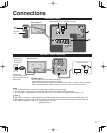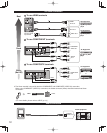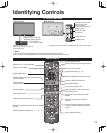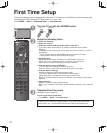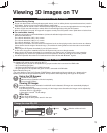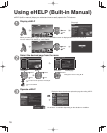
7
FCC and IC STATEMENT
This equipment has been tested and found to comply with the limits for an Other Class B digital device, pursuant to Part 15 of the
FCC Rules. These limits are designed to provide reasonable protection against harmful interference in a residential installation.
This equipment generates, uses and can radiate radio frequency energy and, if not installed and used in accordance with the
instructions, may cause harmful interference to radio communications. However, there is no guarantee that interference will not
occur in a particular installation. If this equipment does cause harmful interference to radio or television reception, which can be
determined by turning the equipment off and on, the user is encouraged to try to correct the interference by one or more of the
following measures:
• Reorient or relocate the receiving antenna.
• Increase the separation between the equipment and receiver.
• Connect the equipment into an outlet on a circuit different from that to which the receiver is connected.
• Consult the Panasonic Service Center or an experienced radio/TV technician for help.
FCC Caution:
To assure continued compliance, follow the attached installation instructions and use only shielded interface cables
when connecting to peripheral devices. Any changes or modifications not expressly approved by Panasonic Corp. of
North America could void the user’s authority to operate this device.
FCC and Industry Canada (IC) RF Exposure Warning:
• This TV is provided with one USB port on rear enclosure for exclusive dedicated use for insertion of the following
optional transmitter: Bluetooth Adapter with FCC ID: NKR-DBUBP207 / IC ID: 4441A-DBUBP207.
• This TV is provided with USB port on rear enclosure for exclusive use for insertion of optional Wireless LAN
Adapter.
• Other transmitters shall not be used, unless specifically recommended when they become available. Other third-
party wireless transmitters have not been RF exposure evaluated for use with this TV and may not comply with FCC
and IC RF exposure requirements.
• The above described transmitter complies with FCC and IC radiation exposure limits set forth for an uncontrolled
environment for mobile use with minimum 8 inches (20 cm) spacing requirement between transmitters and all
person’s body (excluding extremities of hands, wrist and feet) during wireless modes of operation.
Responsible Party: Panasonic Corporation of North America
One Panasonic Way, Secaucus, NJ 07094
Contact Source: Panasonic Consumer Marketing Company of North America
1-877-95-VIERA (958-4372)
email:
consumerproducts@panasonic.com
This device complies with Part 15 of the FCC Rules and all applicable IC RSS standards.
Operation is subject to the following two conditions:
(1) This device may not cause harmful interference, and (2) this device must accept any interference received, including
interference that may cause undesired operation.
■About wireless LAN adapter (Optional Accessory)
●
Wireless LAN adapter and Access point need to be obtained separately.
For the latest information on applicable wireless LAN adapters, check the following website:
http://Panasonic.com/NetConnect
●
Check that the Access point supports WPS*.
(If it does not support WPS, “Password” of the Access point is required when configuring settings.)
●
Follow the instructions on the Access point setup screen and configure the appropriate security settings.
For more details on setting of Access point, please refer to operating manual for the Access point.
●
We recommend using 11n (5 GHz) for the wireless system between the wireless LAN adapter and Access point.
Communication is also possible with 11a, 11b, and 11g (2.4 GHz), but the communication speed may be slower.
●
If the wireless system of the Access point is changed, devices that could connect by wireless LAN may no longer be
able to connect.
●
When Online Movies, DLNA, or other device is using the network, do not disconnect the wireless LAN adapter.
●
Data transmitted and received over radio waves may be intercepted and monitored.
●
Keep the TV away from the following devices as much as possible:
Wireless LAN, microwaves, and other devices that use 2.4 GHz and 5 GHz signals. Otherwise, the TV failures such
as malfunction may occur due to the radio wave interference.
●
When noises occur due to the static electricity, etc., the TV might stop operating for the protection of the devices. In
this case, turn the TV Off with power On / Off switch, then turn it On again.
* WPS: Wi-Fi Protected Setup



